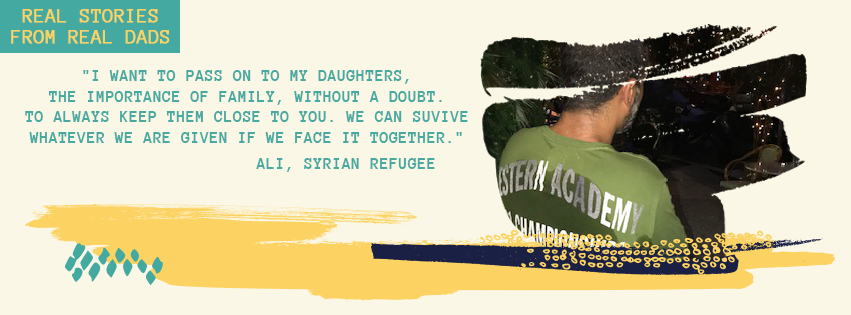
To see them play like regular children, to be able to play with them—at the beach, a park, even here in the cafe.
Even looking out the window for too long, he says, they discouraged back home; and with explosions, bombs, and murders less than three meters from our home, one can understand why. At the park across the street, children who were allowed out often used severed heads as soccer balls, kicking them over piles of dead bodies in a kind of makeshift sport. After four years of living like this, Ali says, the risks of trying to escape didn’t matter. He couldn’t continue living with the idea this might be the only life his children would ever know.
For four years straight we lived with this and it’s why the risks of trying to escape didn’t matter. I couldn’t continue living with the idea this might be the only life my children would ever know.
When Ali and his family fled Syria, his wife was still pregnant with Amna, their youngest. It took twelve tries before they managed to successfully cross the border into Turkey—-and 48 hours of walking once they did—to reach a designated pick up point where a mini-bus could take them to what is known as a ‘gathering spot.’ Here smugglers wait for the arrival of migrants to collect the required payment before journeying across the Mediterranean into Europe. The first stop for Ali’s family was the coastal town of Izmir, where they would attempt the next border crossing in hopes they’d make it somewhere safe before it was time for her to give birth.
Three days later, however, they returned with his wife, who brought devastating news: the doctors told her there was little chance their newborn daughter would survive. Not only that, they were asking for legal documents she didn’t have and had no way to get; when she explained there was no way for her to get them, that her family and husband were still in Syria, unable to join her due to the danger, she was told they’d do what they could for Amene, but she must to return to her family and find a solution.
When Ali and his family fled Syria, his wife was still pregnant with Amna, their youngest. It took twelve tries before they managed to successfully cross the border into Turkey—-and 48 hours of walking once they did—to reach a designated pick up point where a mini-bus could take them to what is known as a ‘gathering spot.’ Here smugglers wait for the arrival of migrants to collect the required payment before journeying across the Mediterranean into Europe. The first stop for Ali’s family was the coastal town of Izmir, where they would attempt the next border crossing in hopes they’d make it somewhere safe before it was time for her to give birth.
“But she did,” he looks at me, humbled to recount it. “She survived. They kept telling us they didn’t know if she would, but she hung on. She made it. And so did we. All of this was a miracle, there’s no other explanation. We all knew it and prayed it would continue to keep us safe the rest of the way to Greece, where we all hoped for a little peace and a chance to recover.”
I saw it with Amna, how she fought for her life because we were all there cheering her on. This is the power family has. My daughters are strong beyond belief now from all they’ve endured.
In Athens now nearly two years, Ali continues his fight to find the stability necessary for him and his family to plan for their future. “It’s impossible to focus on all I want to teach my children when our basic needs are still in question sometimes,” he explains. “I want to stop thinking about these things and be able to spend more time on everything else I have to share with them. Life lessons and values they will need as they grow up, for instance.” When I ask him what he wants most to pass on to his daughters, he doesn’t miss a beat, “The importance of family, to always keep them close to you. We can survive whatever we are given if we face it together. I saw it with Amna, how she fought for her life because we were all there cheering her on. This is the power family has. My daughters are strong beyond belief now from all they’ve endured. There’s no doubt they’re here for a reason and I will do whatever I can to give them the future they deserve. As long as their choices are righteous, I will always keep rooting for them.”
